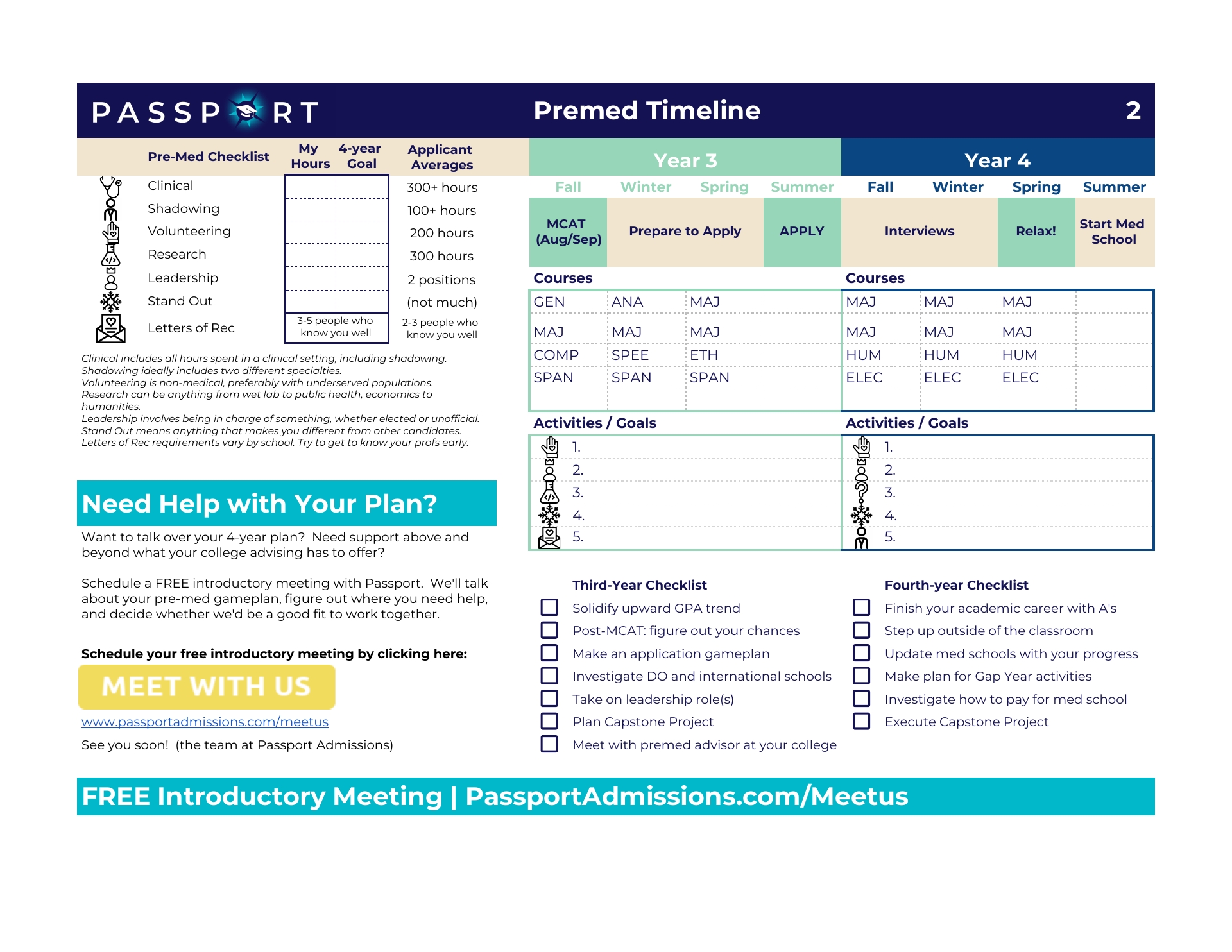
By: Savvy Pre-Med Staff
There’s a lyric in a John Lennon song that says, “Life is what happens when you’re busy making other plans.”
We can see his point - life is unpredictable. And if all you ever do is focus on making future plans, you will never enjoy the present moment.
But we don’t think that pre-meds can afford such a free-spirit approach to their college experience and life goals (sorry, hippies…).
We’re not saying that you need to be hyper-obsessive and plot out every little detail, and we’re not saying that you can’t change your mind or take time to explore.
BUT getting into medical schools is HARD, and the competition is STEEP, so careful planning will be crucial to your success.
And it’s not just about planning in general. You’ve probably heard the phrase “work smarter, not harder.” The same idea applies here. We want to help you “plan smarter” by offering you tips and insights that will give you a strategic advantage.
Before we dive in, go ahead and download our Free Pre-med Planner.
It’s beautiful, and we’re pretty proud of it. We think you’ll like it too.


Unless you come into college with a lot of AP credit, you probably won't be ready to apply to medical school right away.
But that’s not a bad thing. In fact, it’s pretty typical.
Although the “traditional” timeline is applying after junior year, the facts show otherwise. Currently, the average age of applicants is 24, suggesting that the majority of candidates take ~2 gap years.
There are plenty of good reasons to take a gap year, and plenty of good ways to use the extra time to boost your chances of getting in.
If you’re a gunner who wants to apply after junior year, that’s fine, but it will mean completing the “pre-med checklist” AND finding a way to stand out, all in an accelerated fashion.
Here are some key tips (or warnings) for every pre-med freshman, based on our conversations with hundreds of past applicants:
In case you’re wondering what we mean by “MCAT prerequisite courses”:
Don't start studying for the MCAT until your pre-reqs are complete; so, if you're planning on not taking a gap year, your pre-reqs would need to be complete by Spring of sophomore year (that's tough, considering you shouldn’t take more than two science courses at a time).
A lot of colleges - especially pre-med factories - make it hard to get the courses you want as a freshman, so you may need to be flexible!
Beyond the prerequisite courses listed above, you’ll also want to take two semesters of math (statistics and calculus), as well as two semesters of analytical writing (English), to make sure you satisfy the requirements for all the medical schools on your eventual list.
You will typically need to complete 40-50 credits for your major. If you major in science, some of those will be satisfied by your medical school prerequisites. You will probably take most of these courses in your junior and senior years, although there’s probably room for a few of them during sophomore year as well.
Having a big list of activities doesn’t impress the admissions committees very much. They are more impressed by your impact within those activities:
If you’re a hodgepodge of activities, you will become blurrier in their minds. But if you achieve depth--with clear trends in your experiences and accomplishments--you can create a memorable association:
It might sound funny, but creating this “brain-worm” is a huge boon for your application. We’ve worked with hundreds of candidates, and the ones with depth and focus are always easier to recall.
Really, depth is a win-win. It lets you have more balance/time to really dive into your passions, while also achieving the “trackable progress” med schools are looking for.
Example of Trackable Progress:
Freshman year - join organization, help run events, fill some important need
Sophomore year - join planning committee, help establish new events
Junior year - become VP of executive board or recruitment coordinator
Senior year - become president, double membership, expand the org’s reach
This steady increase in responsibility and impact is KEY, since it communicates that you’re a good investment: someone who can follow through but also exceed expectations.
We also HIGHLY RECOMMEND completing a “capstone project.”
We have delved deeper into how to build a capstone project in past articles, but here’s the gist:
a.) Find a problem to solve
b.) Evaluate your resources
c.) Innovate
DISCLAIMER: don’t hold onto a passionless activity simply out of obligation to follow through.
You should feel comfortable dropping an activity after one quarter/semester if:
Network, network, network! You will need stellar letters of recommendation, and you will need to secure highly coveted internships, research positions, etc. What’s the best way to network?
Do What No One Wants to Do!
It might not be fun, but it usually proves your commitment. One past student earned the respect and praise of clinical staff by volunteering to spearhead the clinic’s conversion from a paper to electronic system. As a result of his grunting and grinding, their paper consumption decreased by 90% and the staff were relieved of tasks like printing forms, scanning documents, and shredding paper. The doctors also saved money on supplies, and more importantly, had extra time with patients. This helped him secure a paying job with the clinic during his gap year and helped him garner a fantastic letter of recommendation.
Don’t forget to download our Free Pre-med Planner!
Have any questions about constructing your pre-med 4-year plan? Let us know in the comments below, and we’ll respond to you personally!